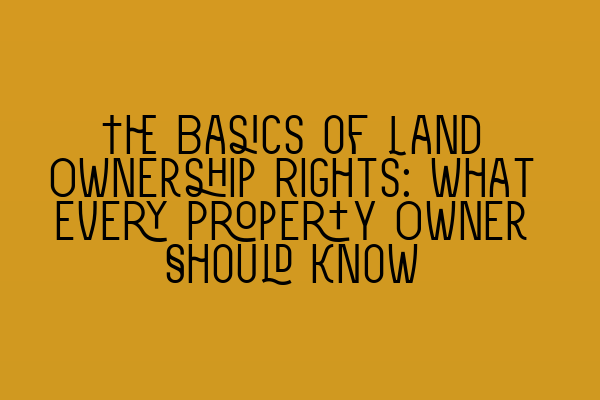As a property owner, it’s important to understand your land ownership rights to ensure that you fully comprehend the privileges and responsibilities that come with owning a piece of land. Whether you are a first-time buyer or an experienced property investor, knowing the basics of land ownership rights will help you navigate the legal aspects of property ownership.
In this article, we will delve into the fundamental concepts of land ownership rights, covering key topics such as types of land ownership, legal restrictions, and the importance of professional legal advice. So, grab a cup of coffee, sit back, and let’s get started!
Types of Land Ownership
Land can be owned in various ways, with different legal implications. The most common types of land ownership include:
- Fee Simple Absolute: This is the highest and most complete form of land ownership, giving you absolute rights over the property.
- Life Estate: This type of ownership grants the owner the right to use and enjoy the property during their lifetime. After their death, the property passes to another designated person.
- Joint Tenancy: Joint tenancy involves two or more individuals co-owning a property, with the right of survivorship. If one owner passes away, their portion automatically transfers to the surviving owners.
- Tenancy in Common: In tenancy in common, each co-owner has a specific percentage of interest in the property. Unlike joint tenancy, there is no right of survivorship, and each owner can freely transfer or sell their share.
Understanding the type of land ownership you hold is crucial, as it determines your rights, obligations, and potential ramifications when it comes to selling, transferring, or inheriting the property. If you are unsure about your land ownership type, consult a property law solicitor to clarify your position and ensure your interests are protected.
Legal Restrictions on Land Ownership
While owning land provides certain rights, it also comes with legal restrictions that must be adhered to. These restrictions are designed to regulate land use and protect public interests. Some common legal restrictions on land ownership include:
- Zoning Regulations: Local authorities implement zoning regulations to control land use, ensuring that certain areas are designated for residential, commercial, or industrial purposes. Violating zoning regulations can result in fines or even forced changes in land use.
- Covenants: Covenants are legally binding restrictions on land use that are typically found in deeds or contracts. These restrictions may include limitations on building height, external modifications, or even the type of activities allowed on the property.
- Easements: Easements grant someone else the right to use a portion of your land for a specific purpose. Common examples of easements include granting utility companies access to install and maintain power lines or allowing a neighbor to use a portion of your driveway for access.
- Environmental Regulations: Your land ownership rights may be subject to environmental regulations aimed at protecting natural resources, wildlife habitats, and preventing pollution. Failure to comply with these regulations can result in severe penalties.
It is essential to familiarize yourself with any legal restrictions that may apply to your property. Conducting a thorough title search and seeking professional legal advice can help you identify and address any potential issues before they arise.
The Importance of Professional Legal Advice
When it comes to land ownership rights, seeking professional legal advice is paramount. A property law solicitor can provide you with the guidance and expertise needed to navigate complex legal frameworks and protect your interests.
Here are a few reasons why professional legal advice is crucial:
- Title Examination: A property law solicitor can conduct a comprehensive title examination to ensure that the property’s ownership is clear and free from any encumbrances or disputes.
- Contract Review and Negotiation: If you are buying or selling land, a solicitor can review and negotiate contracts to ensure that your rights are protected and that the terms are fair and equitable.
- Legal Compliance: A solicitor will ensure that you comply with all legal requirements, including filing necessary permits and documents, adhering to zoning regulations, and meeting environmental standards.
- Dispute Resolution: In the unfortunate event of a property dispute, a property law solicitor can represent you, negotiate settlements, or even litigate on your behalf to safeguard your land ownership rights.
Remember, prevention is always better than cure. By seeking professional legal advice early on in your land ownership journey, you can avoid potential legal pitfalls and ensure a smooth and secure transaction.
In conclusion, understanding the basics of land ownership rights is essential for every property owner. By familiarizing yourself with the different types of land ownership, legal restrictions, and the importance of professional legal advice, you can navigate the complexities of property ownership with confidence.
If you would like to explore more resources related to property law and the SQE exams, check out these articles:
- SQE 1 Practice Exam Questions
- SQE 1 Practice Mocks FLK1 FLK2
- SQE 2 Preparation Courses
- SQE 1 Preparation Courses
- SRA SQE Exam Dates
We hope you have found this article informative and insightful. If you have any further questions or require professional legal assistance, do not hesitate to contact SQE Property Law & Land Law. Our team of experienced solicitors is here to help you navigate the intricacies of land ownership and ensure that your rights are protected.
